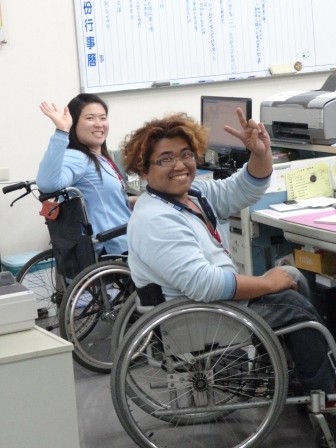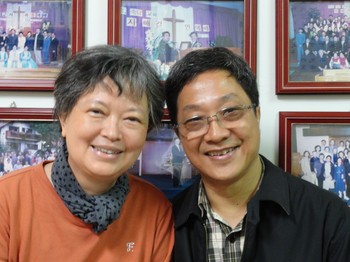For Hau-Sheng Chng being a good pastor means being a good neighbor. As a member of the Christian minority in a rural community in central Taiwan, Chng believes the best witness to his faith is to show what it means to be a Christian.
Since 1988 when he and his wife, Shin-Hui Chen, accepted the call to serve in team ministry at Ju Dang Presbyterian Church in Tek Tung, Chng has taken seriously their commitment to stay in the community and serve its poor and needy.
The couple has kept that promise despite the job possibilities generated by Chng’s work in the wider church. He currently serves as global treasurer for the Council for World Mission and recently completed a term as the moderator of the powerful Evangelism Committee of the General Assembly of the Presbyterian Church in Taiwan (PCT).
Yet Chng stays on in the small community where Christians number only 0.1 per cent of the population in comparison to the 5-7 per cent in some of Taiwan’s large urban centers.
Since the pastoral couple arrived 25 years ago, the congregation has grown from 10 members to more than 104 who attend weekly services. At the same time, Ju Dang Presbyterian Church has gone from being the poorest congregation in the presbytery to supporting a range of church and community outreach initiatives. The younger generation is getting involved in church life and village children have sought baptism.
Chng credits the growth to a rebirth of hope. The congregation had been without a permanent minister for 20 years. During that time many members had left for the city in search of employment. The few active members left behind felt deserted by their church and by God.
“The building was broken, the whole community was broken,” says Chng. But the couple felt called to witness that God doesn’t give up on the church. “We may be small but we are not weak,” they told their parishioners.
Their first project was to establish a small library for children in order to build community relations with their Taoist and Buddhist neighbours. While Chen focused on mission with children through establishing a choir, organizing a baseball team, and producing Christmas dramas for the community, Chng offered pastoral care to former parish members living in Tainan and Taipei.
Chng’s support of local social needs has earned him the respect of his non-Christian neighbors. He is now invited to participate in celebrations such as Buddha’s birthday where he has eaten rice soup ― a symbolic gesture frowned on by some parishioners even when he explains that it is the same as Buddhists accepting their invitations to share Christmas treats.
These connections to the community’s other faith groups come out of Chng’s social organizing skills which he learned in the Urban Rural Mission program and from his study of ecumenism and dialogue during a term at the World Council of Churches’ Ecumenical Institute of Bossey in 1994-95.
Chng, who has a doctorate from Louisville Presbyterian Theological Seminary in the United States, believes that what he has learned from travel and reading has given him the practical skills for service in today’s Reformed church parishes. “Stories have been my mentors,” he says. “They have inspired me.”
Chng is a leading example of what could be referred to as a wave of “evangelists cum social entrepreneurs” that serve small PCT parishes with special ministry needs. These modern missionaries combine an approach to parish life based on prayer groups, Bible study and church growth projects with a flair for launching successful NGO-style businesses to generate income for social ministries.
Ju Dang’s budget for 2013 of $235,000 supports eight full-time staff. $134,000 comes from members, $70,000 is government support for the school project and $30,000 is contributed by donors.
But Chng does not aspire to mega-church success. He prefers to lead the simple life of a rural pastor, living close to his parish members and investing the congregation’s money in social outreach projects.
Chng believes that the new generation of seminarians needs to learn that ‘small is beautiful’ and not be overwhelmed by the success of mega-churches.
“What is ‘success’?” he asks. “To construct a large building or to live with the people?”
Twenty-five years ago, Chen and Chng challenged the congregation to become self-supporting and to be what Chng calls a “creative minority.”
“Now I look back in surprise,” says Chng. “We were poor but through God’s grace have done so much.”
Models for mission
Pastor Hau-Sheng Chng and members of Ju Dang Presbyterian Church in Tek-Tung, Taiwan offer their business acumen and Christian values in service to the broader community.
Chng serves as president of the Happy Christian Home for severely physically and mentally challenged residents. The home’s founder Joyce McMillan, a U.S. Presbyterian, came to Taiwan in 1965 to serve as a nurse for one year. She stayed for the rest of her life to work with children affected by polio who were living in the streets.

Workers at Agape Printing Company, one of the entrepreneurial efforts of Ju Dang Presbyterian Church —Kristine Greenaway
Yu-Chang Lin, a polio survivor and former resident, is the home’s current superintendant while running a restaurant, bakery and dumpling production company staffed by mentally challenged young adults from the home. Lin is a member of the Ju Dang congregation.
So is another polio survivor, Chong-Shen Chen, who is the CEO of the Agape printing company. His staff works from wheelchairs or are mentally challenged. Both Lin and Chen were initially drawn to the parish because of its wheelchair access entrance and have stayed on as members.
Elder Ke-long Liou recently took early retirement from his post as a counselor in an elementary school in order to work with Chng’s wife and co-pastor, Shin-Hui Chen in the congregation’s education program.
In addition to an after school program offering children a place to do their homework, the parish hosts a program funded by the government for troubled teenagers who need support and guidance and the chance to study in specially-designed classes.
Liou is preparing to become the volunteer principal of the program
Kristine Greenaway serves as head of the Office of Communications for the World Communion of Reformed Churches (WCRC) in Geneva, Switzerland. The PC(USA) is a WCRC member church.

